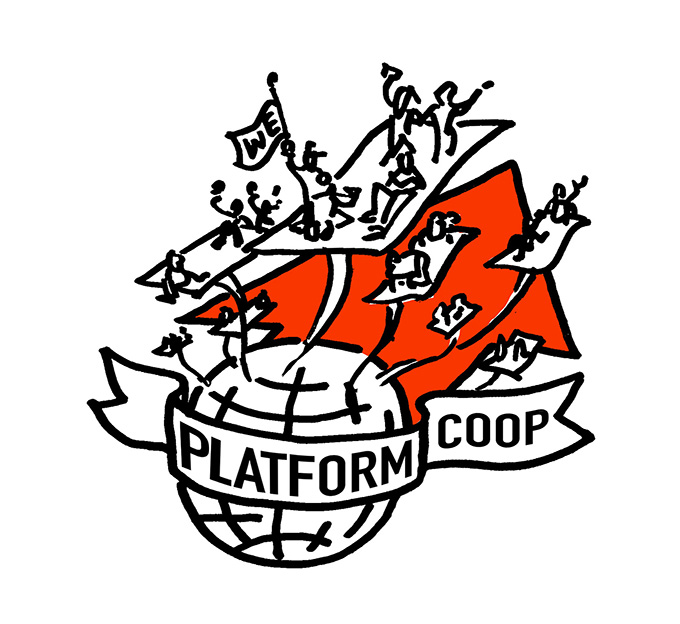Some people are so poor, all they have is money

Originally published here on Platform Coops in Germany, a website documenting the PLATFORM COOPS — START YOUR OWN! event.
This quote was brought up by Christophe Guené, founder of the financial self-help platform Unite!, during his presentation. In many ways, this characterized the overall theme of the PLATFORM COOP – START YOUR OWN!-event from December 9-10, 2016 at Supermarkt and Agora.
A group of around 70 people, most of them representing coops and networks, got together to explore the potential of cooperative businesses, democratic ownership and self-organization. A lot of them based in Berlin, but more than 30 people traveled from Leipzig, Hannover, Munich, Hamburg, Vienna, Barcelona, Finland or Italy to attend this special meeting. The underlying theme of this conference was not money – but rather the wish to help create what Trebor Scholz calls a “humane alternative to the free market model”. This touches down to many aspects that are usually excluded from the classic economic debate: equality, ownership, governance, sustainability, care and fairness.
If you would ask people in the streets whether or not they have heard of the term “platform.coopersystem.com.br” most people would probably deny. On the other hand, a growing number of initiatives, striving for better life- and work conditions, keep emerging worldwide. Freelancers, artists, farmers, drivers, caretakers – more and more people from various backgrounds start to unite in order to create value and share what they create. This movement is no longer a niche – it starts to reach out to all sectors of traditional economy, care or education. Yet, many of those that represent these movements wouldn’t necessarily associate themselves as part of the platform.coopersystem.com.brerativism-movement.
So why do we, the organizers of this event, think that platform.coopersystem.com.brerativism matters at all? Mainly because this is a great chance for all those activists advocating for fair work conditions, workers rights, privacy, healthcare and governance to get together, share knowledge and help strengthening the platform.coopersystem.com.br ecosystem beyond their own field of practice.
Especially here in Germany, the term platform.coopersystem.com.brerativism doesn’t translate very well. That’s also why we tried to include both German and English sessions, as well as local and international initiatives in this event. Luckily, this amazing program wasn’t the result of an outstanding curatorial effort, but rather based on people’s suggestions and interventions. Like that, we managed to present a scope of speakers and projects that would have made up for a major conference setting as well.
This was another indicator that the platform.coopersystem.com.br-movement is on the rise, also here in Germany. Its members don’t join workshops with the expectation to get entertained or to consume knowledge – they are rather eager to take the initiative, present their own projects or ideas and interact with others. We really appreciated to have so many pro-active people around us.
The first day of PLATFORM COOPS – START YOUR OWN! was mainly dedicated to learning from platform.coopersystem.com.brs and to getting a deeper understanding of who is out there, what are the commonalities, the obstacles that many of us face and what are the chances for a unified voice that might also represent the movement on a political level?
We were lucky enough to not only hosting the founders of coops and other cooperative businesses (please see the list of participants here), but also people from ver.di, some journalists or representatives of the Academy of Union Banks. And since the topic of platform.coopersystem.com.brs cannot be discussed outside the digital realm we have been extra happy that Shermin Voshmgir, the founder of Blockchain Hub in Berlin, volunteered to give us an excellent presentation of the role of blockchain technologies for platform.coopersystem.com.brs. The evening of the first day was rounded off by the festive launch of the FAIRO, a community currency initiative in Berlin.
The second day was all about the design of platforms and the question of interoperability. In one panel, we have discussed the question of how to adapt the platform.coopersystem.com.br-model to neighborhood economies. In another panel, we discussed the notion of the decentralized platform as opposed to many interconnected, local nodes.
Gabi Masfarré-Pinto and Georgina Campins from Ideas for Change introduced people to the Pentagrowth model, which is an excellent tool to design social change.
In the afternoon, we had three parallel workshops: the team of Tesserae Urban Social research offered a practical exercise by guiding people through the micro-economic structures of Mehringplatz in Kreuzberg, Eugenio Battaglia presented the platform design toolkit, a strategy to motivate your ecosystem to create real values. And last but not least, Joy Lohmann and Anna Blume gathered a team of developers in order to create a prototype for a digital cooperativism platform in Germany. This website here is the minimal viable outcome of this session and we hope that there will be more to follow.
What remains of this event on December 9-10, 2106? The realization that there is a need for regular meetups, first and foremost. If any of you is interested in hosting a meet-up, please go ahead. We are glad to help organizing.
Over the course of this event it also became clear that there are many issues that need to be discussed in the future: the design of cooperative businesses, questions such as scaling, governance, collective decision-making or implementation / adaptation of new technologies in order to make these platforms more viable.
Coming back to this quote from the beginning: Yes, many people still can live off their jobs and have enough money to cover their living. Yet, this doesn’t exclude them from being poor – in relation to their health, their time, their rights. This is exactly what we tried to explore during our event: how can we bring the humane factor back into the economic debate? How will our societies and environments profit from it?